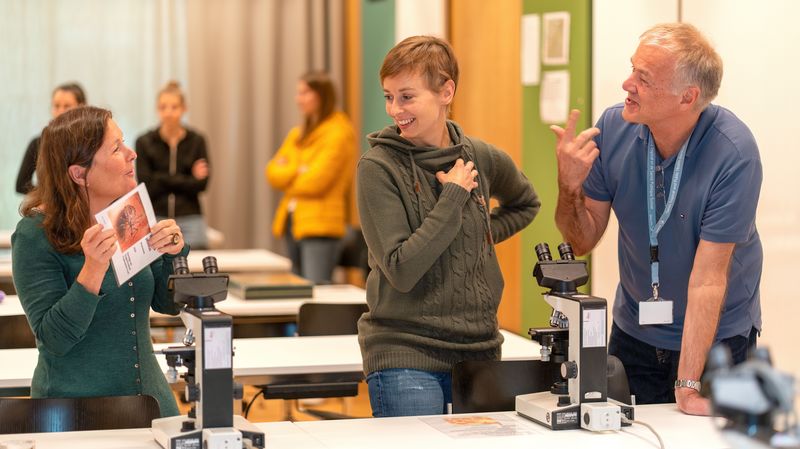Internationale Zusammenarbeit und globale Gesundheit (IZGG)

In our globalised world, many professionals work in multicultural contexts. For health professionals in Switzerland and Europe, dealing with these global contexts is not only stimulating, but increasingly fundamental to their daily work. Professionals working internationally in the health sector, or preparing to work abroad, often face complex and multifaceted challenges. Living and working in an environment of extreme resource scarcity requires a deep understanding of local conditions and an adapted approach.
Enter the Certificate of Advanced Studies in International Cooperation and Global Health. Over 8 weeks (approximately 230 contact hours) you will gain the knowledge and skills to understand health in multicultural and global contexts. The course is designed for professionals from all sectors of the health care system and interested individuals from other fields who work with intercultural communication, migration and health in a global context, or who are preparing to work abroad. Upon successful completion of all modules, you will be awarded a Certificate of Advanced Studies (CAS) accredited by the University of Basel.
The course consists of two modules (Internationale Zusammenarbeit and Globale Gesundheit, 4 weeks each), which can be taken independently. It is also possible to take the modules in 2-week block courses (Vernetzte Welt, Internationaler Kontext, Geographische Medizin and Gesundheitsinterventionen). In order to be well prepared for an international placement, it is recommended that you complete both modules. You can take individual modules or sub-modules if you do not wish to obtain the CAS IZGG certificate.
At a Glance
Course Structure
The CAS IZGG is a good foundation for working on migration and health issues in Switzerland and Europe, and an ideal preparation for international assignments with national or international organisations. The first module (4 weeks), Internationale Zusammenarbeit, covers the basics of socio-cultural, cultural-geographical and ecological relationships in a global context. The second module, Globale Gesundheit, is an in-depth study of a wide range of diseases and interventions to improve the health of individuals and populations in different regions and in different health and social system contexts.
The teaching language of the course is German, although some content (e.g. texts or videos) might be in English. English language skills are an advantage but not a prerequisite.
Module A: Internationale Zusammenarbeit | Module B: Globale Gesundheit |
| Submodule A1: Vernetzte Welt | Submodule B1: Geographische Medizin |
|
|
| Submodule A2: Internationaler Kontext | Submodule B2: Gesundheitsinterventionen |
|
|
Course Dates
The CAS IZGG is divided into two main modules: Internationale Zusammenarbeit and Globale Gesundheit, each lasting 4 weeks. These modules can be taken individually or in smaller, 2-week submodules. You can also attend individual modules or submodules without committing to the full CAS IZGG programme. See below for a comprehensive schedule of dates for all modules and submodules offered in the programme.
Course Dates 2026
Module A: Internationale Zusammenarbeit, 2 – 27 March 2026
Submodule A1: Vernetzte Welt, 2 – 13 March 2026
Submodule A2: Internationaler Kontext, 16 – 27 March 2026
Module B: Globale Gesundheit, 5 - 30 October 2026
Submodule B1: Medizinische Geographie, 5 - 16 October 2026
Submodule B2: Gesundheitsinterventionen: 19 - 30 October 2026
What Our Alumni Say about the CAS IZGG

“My interest in other cultures, my constant curiosity and the desire to work on a project abroad were the driving force behind my search for a suitable postgraduate programme. Looking back, I have to say that I couldn't have made a better choice than attending the IZGG. The range of topics covered in the lessons is very broad and provides a good overview of the context.”
Xandaira Straub
Registered Nurse, Advanced Federal Diploma of Higher Education, Lucerne Cantonal Hospital

“The CAS IZGG enabled me to deepen my understanding of socio-cultural contexts. In my daily work, I increasingly care for people from different countries of origin who have different ways of living and dealing with illness. The content I have learnt has enabled me to understand some of their behaviour better. If I understand the context, I can achieve more in the field of health. I highly recommend the CAS to everyone.”
Rosaria Mazzillo
Registered Nurse, Advanced Federal Diploma of Higher Education, Spital Limmattal
Who Should Apply for this Programme?
The course is aimed at health professionals from all sectors (nursing, medicine, health promotion, prevention, etc.) and interested people from other professions who are faced with intercultural communication, migration and health in a global context or who are preparing to work abroad.
Certification
The CAS in International Cooperation and Global Health certificate is awarded to participants who have completed the entire course and passed all four submodule exams.
Participants who attend only individual modules or who do not pass the exam will receive a certificate of attendance from Swiss TPH.
To ensure good preparation for an assignment in international cooperation, attendance of all modules is recommended. All modules of the CAS IZGG can be attended individually and independently of each other.
Application Process and Entry Requirements
Admission to the course requires a university degree or completed vocational training and two years' professional experience.
Applications are considered in the order they are received. Once you have registered, you will receive confirmation and an invoice for the course fees.
Course Fees
Full course (8 weeks): CHF 6,200
Enrolment in one module (A or B, 4 weeks): CHF 3,200
Enrolment in a single module (A1, A2, B1, B2, 2 weeks): CHF 1,650
Course fees must be paid at least 4 weeks before the start of the course. Cancellations received less than 4 weeks before the start of the course are subject to a fee of CHF 500.
Insurance is the responsibility of the participants. In the event of an insufficient number of participants, the course may be cancelled up to 4 weeks prior to the start of the course. Swiss TPH cannot be held responsible for any costs incurred, such as travel or accommodation.